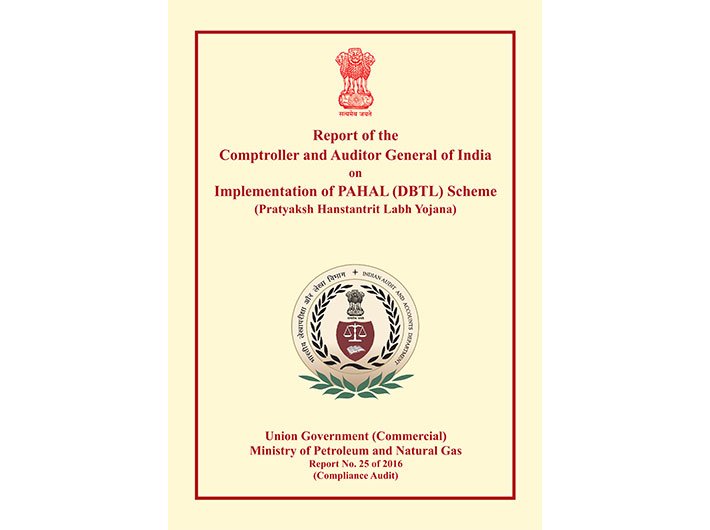The government claimed that DBT in cooking gas saved over Rs 21,000 crore. Now the CAG finds that the actual figure was less than a tenth of it
The Comptroller and Auditor General (CAG) of India has strongly contested the government’s claim of having saved several thousands of crores through the direct benefit transfer for LPG (DBTL). In an audit report titled ‘Implementation of Pratyaksh Hastantrit Labh Yojana (PAHAL Scheme)’, it put the savings at only Rs 1,763.93 crore against the government claim of Rs 21,261 crore, in 2014-15 and 2015-16.
The government launched the scheme in November 2014. To sell the effectiveness of the DBT platform as ‘the’ medium to deliver social security payments and benefits, the government claimed that the savings accrued from the transfer of subsidy paid on the cooking gas directly into consumers’ bank accounts was Rs 14,818 crore for 2014-15 and Rs 6,443 crore for 2015-16.
The cash transfer system was conceptualised by the UPA government, which called it a ‘game-changer’ and key to revive its fortunes in the 2014 national elections. Due to faulty execution, the UPA government abandoned the programme just before elections, fearing backlash from the voters.
In his 2015 Independence Day address, PM Modi claimed that India had saved Rs 15,000 crore annually in subsidy outgo for cooking gas thanks to DBTL and GiveItUp campaign.
The auditor also found several duplications and errors in the databases of the three oil marketing companies. “Audit verified existence of multiple connections bearing ‘same Aadhaar number’ and ‘same bank IFSC and same bank account number’. The verification identified 74,180 LPG customers linked to 37,090 Aadhaar numbers indicating existence of multiple connections. In the case of ‘same bank IFSC and the same bank account number’, 17,694 LPG ‘active’ customer IDs were linked with 8,847 same bank IFSC and same bank account number,” the report said.
The CAG noted that although the DBTL scheme seems to address the issue of diversion of subsidised LPG cylinders for commercial purposes, there is “the risk of diversion of non-subsidised domestic LPG for commercial uses”. There is, indeed, a significant difference in the cost of non-subsidised domestic LPG and commercial LPG on account of differential taxes and duties levied on the two categories of consumers.
Some highlights from the report:
* The actual subsidy payout during the period from April 2015 to December 2015 was Rs 12,084.24 crore as against Rs 35,400.46 crore during April 2014 to December 2014. The significant reduction of Rs 23,316.21 crore in subsidy payout was on account of the combined effect of decrease in off-take of subsidised cylinders by consumers and lower subsidy rates arising from the sharp fall in crude prices in 2015-16. Audit examination indicated that reduced subsidy rate on account of fall in crude oil price resulted in reduced subsidy payout of Rs 21,552.28 crore, while the effect on the same due to reduced offtake of cylinders by consumers worked out to Rs 1,763.93 crore. Therefore, it is evident that the lower subsidy rates in 2015-16 are, by far, the most significant factor resulted in subsidy savings.
* The ministry of petroleum and natural gas estimated (in February 2016) potential savings in LPG subsidy for 2015-16 at Rs 9,211 crore while the oil marketing companies estimated the savings for the same period at Rs 5,107.48 crore. The methodologies adopted by the ministry and the OMCs were different. In both estimations, however, audit noticed inherent inconsistencies which would lower the estimated savings. MoPNG assumed that the inactive or blocked consumers, who were not eligible for subsidy would have availed the entire quota of 12 cylinders against the national average per capita consumption of 6.27 cylinders in 2014-15. Considering the national average off-take of 6.27 cylinders (as used by OMCs in their estimation), the estimated savings in subsidy for 2015-16 would be Rs 4,813 crore only.
[email protected]

